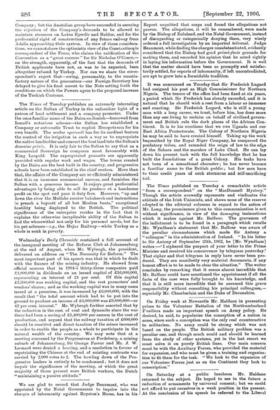Wednesday's Daily Chronicle contained a full account of the inaugural
meeting of the Reform Club at Johannesburg at the end of August, when Mr. Wybergh, the president, delivered an address on "The Necessity for Reform." The most important part of his speech was that in which he dealt with the finance of the mining industry. He showed from official sources that in 1901-5 thirty-three companies paid E1,000,000 in dividends on an issued capital of 216,000,000, representing an interest of 24 per cent. Of this capital £3,300,000 was working capital, and the rest promoters' and vendors' shares ; and as the working capital was in many cages issued at a premium, it was increased by £6,000,000, with the result that "the total amount which had to be put into the ground to produce an income of 24,000,000 was £9,000,000—or 42 per cent. interest." Mr. Wybergh further asserted that by the reduction in the cost of coal and dynamite since the war there bad been a saving of £1,400,000 per annum in the cost of production, and argued that the railway taxation of 2600,000 should be remitted and direct taxation of the mines increased in order to enable the people as a whole to participate in the natural wealth of the country. We may note that at a meeting convened by the Progressives at Fordsburg, a mining suburb of Johannesburg, Sir George Farrar and Mr. J. W. Leonard were denied a hearing, and a resolution in favour of repatriating the Chinese at the end of existing contracts was carried by 2,000 votes to 2. The howling down of the Pro- gressive leaders is entirely to be condenined ; but it does not impair the significance of the meeting, at which the great majority of those present were British workers, the Dutch "maintaining a passive attitude."






































 Previous page
Previous page